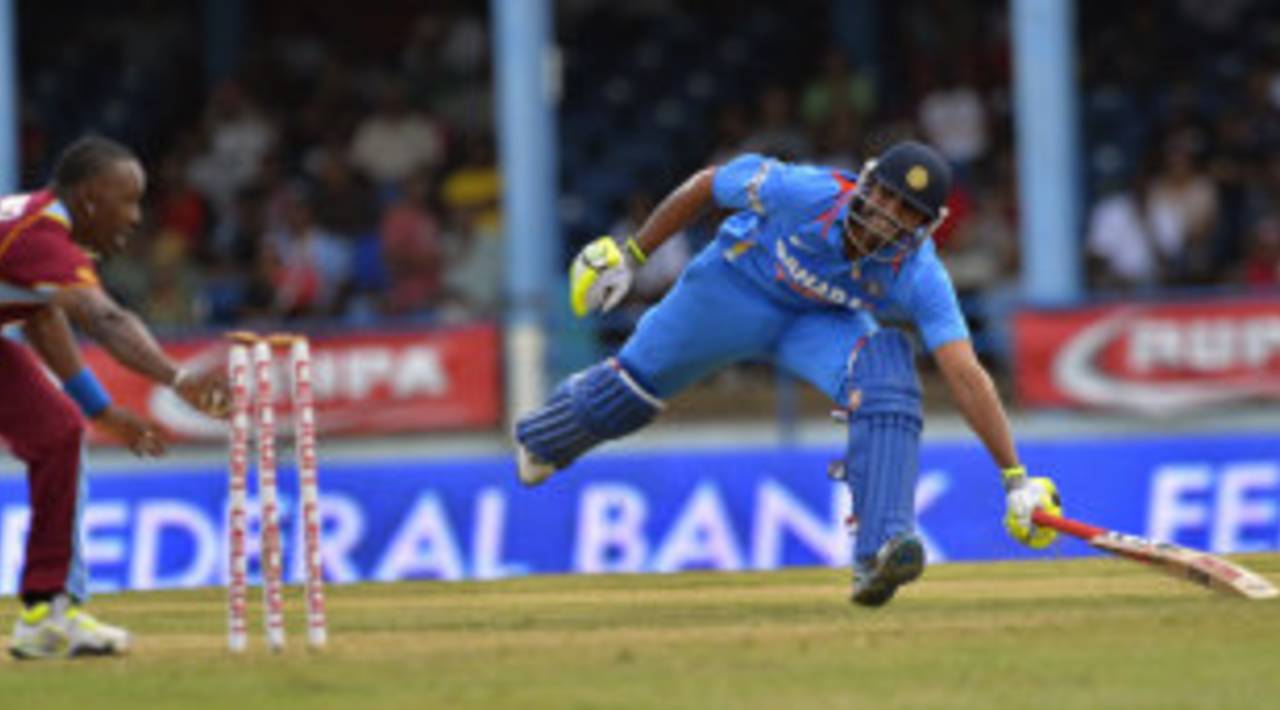Run, batsman, run
Why do batsmen not attempt to run until they are run out off the final ball of an innings, when it might bring an extra run for their team?
Bishen Jeswant
27-May-2014

The batsman could be run out if he attempts a hopeless run off the last ball of the innings. So what? • AFP
The venue is the Dubai International Cricket Stadium. Rajasthan Royals are nine down and need 24 in the last over to overhaul Chennai Super Kings' total of 140. Dhawal Kulkarni swats R Ashwin for two sixes and brings the equation down to nine off two balls. He hits the fifth ball to long-on and the only way Royals can stay in the match is if the batsmen run two, so Kulkarni can try and hit the final ball for six to tie the game.
Kulkarni recognises this and pushes for the second run to get on strike. His partner Pravin Tambe, however, has turned down the second, though it would leave him needing to score eight runs off one ball. Kulkarni carries on and the confusion ends with Tambe being run out at the non-striker's end and Royals losing. Why did Tambe not run? Was it his inexperience, a brain freeze or the high probability of being run out that dissuaded him?
Tambe's inaction is not the only instance of batsmen not running when there was almost nothing to lose for the team. In Hyderabad, Royal Challengers were setting Sunrisers a target, with Sachin Rana facing the final ball of the innings. He missed Dale Steyn's delivery but did not run even though his partner Mitchell Starc had tried to steal a bye to the wicketkeeper. Starc was run out.
Even an experienced player like Kieron Pollard has not always run flat out off the final ball of an innings. Every run is important - to state the obvious - and 55 T20s and 26 ODIs have been decided by a one-run margin.
Looking beyond the IPL, Ravindra Jadeja was guilty of not running when everything was at stake in an ODI. In Auckland, India needed two off the final ball to pull off an incredible chase, and this is an excerpt from ESPNcricinfo's report of the game: "Jadeja failed to beat cover, finished the single comfortably, but for some reason didn't go for the second. The second was not on, but you never know what fielders are liable to do under such pressure situations. Jadeja and Aaron had nothing to lose with the second, but they didn't go for it. It was a difficult night to explain."
It is indeed difficult to explain why some batsmen won't put their wicket on the line for an extra run - however improbable - in the final moments of an innings. Perhaps it is to safeguard his batting average, because better numbers might mean a higher bid at the next IPL auction. Perhaps the player weighs the likelihood of being dismissed against that of scoring a run and decides the probability of making it is miniscule. But, however miniscule it may be, surely it is in the team's interest for the player to try and get an extra run - even if he fails 98 out of 100 times at the cost of his wicket?
In the IPL, if two or more teams are tied on points and net run-rate (a remote possibility), the team with the greater number of 'wickets taken per balls bowled' will have a higher position on the league table. The necessity of such a tiebreaker is remote and the players' awareness of it is rather unlikely.
If a batsman runs until he is run out off the final delivery, there is at least a chance the fielder will buckle under pressure and fumble the ball - or that a wayward throw will result in overthrows - and an extra run may accrue. In the worst case, the batsman will be dismissed. So what if he is?
Bishen Jeswant is a stats sub-editor at ESPNcricinfo. He tweets here.